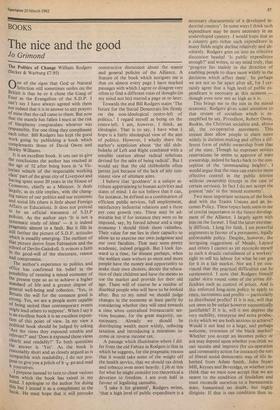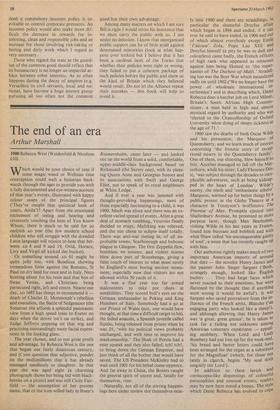BOOKS
The nice and the good
Jo Grimond
The Politics of Change William Rodgers (Seeker & Warburg £7.95) The Politics of Change William Rodgers (Seeker & Warburg £7.95)
°ne of the signs that God or Natural Selection still sometimes smiles on the British is that he or it chose the Gang of Four as the Evangelists of the S.D.P. I can't say 1 have always agreed with them nor indeed that it is in answer to any prayers of mine that the call came to them. But now that the mantle has fallen I must at the risk of blasphemy congratulate whoever was responsible. For one thing they compliment each other. Bill Rodgers has kept the good Work going by publishing a book which complements those of David Owen and Shirley Williams.
It is an excellent book. It sets out to give the conclusions the author has reached at the age of 52 after being born in 'a Vic- torian suburb of the respectable working class' part of the great city of Liverpool and having spent some 20 years in the House of Commons, chiefly as a Minister. It deals largely, as its title implies, with the chang- ing nature of our politics and our economic and social life (there is little about Foreign Affairs or Education). It does not pretend to be an official statement of S.D.P Policies. As the author says 'It is not a systematic study of ideas' — it is indeed Pragmatic almost to a fault. But it fills in still further the picture of S.D.P. attitudes which is steadily emerging. The outlines of that picture derive from Fabianism and the school of Devlin-Gaitskell. It evinces a faith in the good-will of the electorate, reason and compromise. The author's experience in politics and Office has confirmed his belief in the Possibility of running a mixed economy of the present type so as to achieve a higher standard of life and a greater degree of general well-being and cohesion. 'Yes, in Britain the will for the common good is
strong. Yes, we are a people more capable
of being united than contemporary events might lead others to suppose'. When I say it is an excellent book it is an excellent exposi- tion of this point of view. In my view a Political book should be judged by asking Are the views they expound tenable and relevant?' and 'Does it expound those views clearly and readably?' To both questions the answer is 'Yes'. As the book is reasonably short and as closely argued as is compatible with readability, I do not pro- Pose to give you a precis of it 4 go and read it Yourselves.
I propose instead to turn to chase various hares which the book has ' raised in my Mind. I apologise to the author for doing this but I intend it as a compliment to the book. He must hope that it will provoke
constructive discussion about the stance and general policies of the Alliance. A feature of the book which intrigues me is that on almost every page I have marked passages with which I agree or disagree very often to find a different train of thought (in my mind not his) started a page or so later.
Towards the end Bill Rodgers states 'The future for the Social Democrats lies firmly on the non-ideological centre-left of politics.' I regard myself as being on the centre-left. I am, however, I think, an ideologist. That is to say, I have what I hope is a fairly ideological view of the aim of politics. However, I wholly share the author's scepticism about 'the old shib- boleths of Left and Right combined with a sensible caution about radical solutions devised for the sake of being radical'. But I would say that the old shibboleths often persist just because of the lack of any con- sistent view of ultimate aims.
I believe that 'goodness' is a unique at- tribute appertaining to human activities and states of mind. I do not believe that it can, for instance, be defined as a combination of efficient public services, full employment, satisfactory industrial relations and a three per cent growth rate. These may be ad- mirable but if for instance they were to be imposed, say, by forced labour and a siege economy I should think them valueless. Their value for me lies in their capacity to allow us to exercise our own judgment and our own faculties. That may seem pretty academic, indeed priggish. But I look for- ward to a time, far distant perhaps, when the welfare state withers as more and more people have the money and opportunity to make their own choices, decide the educa- tion of their children and have the means to use the market and provide for their old age. There will of course be a residue of disabled people who will have to be looked after. But to my mind we should judge changes in the economy at least partly by considering whether they will tend towards a time when centralised bureaucratic ser- vices become, for the great majority, un- necessary. Already we should be distributing wealth more widely, reducing taxation and introducing a minimum in- come or reverse income tax.
A passage which illuminates where 1 dif- fer from the old Fabian in Rodgers is that in which he suggests, for the pragmatic reason that it would take some of the weight off the health service, that we should tax drink and tobacco even more heavily. I jib at this for what he might consider too theoretical a devotion to freedom. I am even half in favour of legalising cannabis.
`I take it for granted', Rodgers writes, `that a high level of public expenditure is a necessary characteristic of a developed in- dustrial country'. In some ways I think such expenditure may be more necessary in an undeveloped country. I would hope that as a country gets richer such expenditure in many fields might decline relatively and ab- solutely. Rodgers goes on into an effective discussion headed 'Is public expenditure enough?' and writes, to my mind truly, that `progress lies mainly in the direction of enabling people to share more widely in the decisions which affect them'. So perhaps we are not so far apart after all, for I cer- tainly agree that a high level of public ex- penditure is necessary at this moment though even now not as high as it is.
This brings me to the mix in the mixed economy. Rodgers gives scant attention to that stream of socialism which is ex- emplified by say, Proudhon, Robert Owen, Ruskin, the Christian socialists and, above all, the co-operative movement. This stream does allow people to share more widely in decision-making and offers a dif- ferent form of public ownership from that of the state. Though he expresses serious reservations he seems to approve of state ownership, indeed he harks back to the con- ception of the 'commanding heights'. I would argue that the state can exercise more effective control in the public interest without ownership (except in the case of certain services). In fact I do not accept the present 'mix' in the 'mixed economy'.
Two most important sections of the book deal with the Trades Unions and an In- comes Policy. These topics both seem to me of crucial importance in the future develop- ment of the Alliance. I largely agree with him on the former. I find the latter extreme- ly difficult. I long for faith. I see powerful arguments in favour of a permanent, legally enforceable policy. Despite,, however, the intriguing suggestions of Meade, Layard and others I cannot as yet reconcile myself to such a drastic curtailment of a workers' right to sell his labour for what he can get for it in a fair market. Nor am I yet con- vinced that the practical difficulties can be surmounted. I note that Rodgers himself rather skirts round some of the prime dif- ficulties such as control of prices. And is this enforced long-term policy to apply to rents, increments and profits — particularly to distributed profits? If it is not, will that not seem to be unfair however economically justifiable? If it is, will it not depress the very mobility, enterprise and extra produc- tivity which we are both anxious to achieve? Would it not lead to a large, and perhaps welcome, extension of the black market? Whether you accept an incomes policy or not may depend upon whether you think we can sustain and improve (by co-operation and community action for instance) the sort of liberal social democratic way of life in- herited from Adam Smith, John Stuart Mill, Keynes and Beveridge, or whether you think that we must now accept that we are nearer to the condition of feudalism and must reconcile ourselves to a bureaucratic state, humanised no doubt, but highly dirigiste. If that is our condition then in- deed a compulsory incomes policy is in- evitable to control corporate pressures. An incomes policy would also make more dif- ficult the decrease in rewards for in- teresting, clean and responsible jobs and an increase for those involving risk-taking or boring and dirty work which I regard as very necessary.
Those who regard the state as the guard- ian of the common good should reflect that its bureaucracy is no longer an impartial ar- biter between other interests. As so often happens during the decay of empires (e.g. Versailles) its civil servants, local and na- tional, have become a huge interest group pursuing all too often not the common good but their own advantage.
Among many matters on which 1 am sure Bill is right I would stress his insistence that we must carry the public with us. I am under no delusion. I know that unorganised public support can be of little avail against determined minorities (look at what hap- pens over strikes) but 1 believe that it has been a cardinal, fault of the Tories that whether their policies were right or wrong, they failed to put a coherent package of such policies before the public and show us the kind of Britain which they believed would result. Do not let the Alliance repeat their mistakes — this book will help to avoid it.



































 Previous page
Previous page